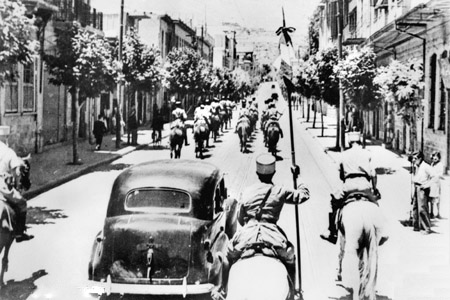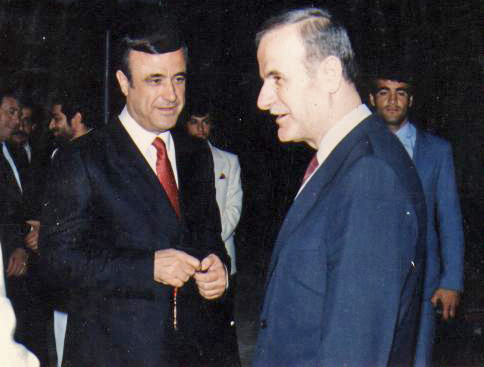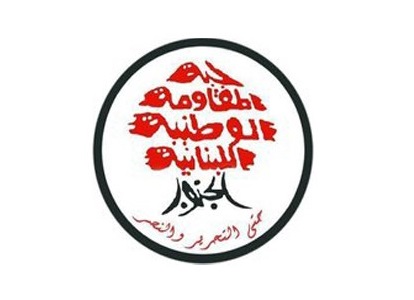|
Assef Shawkat
Assef Shawkat (; 15 January 1950 – 18 July 2012) was a Syrian military officer and intelligence chief who was the Deputy Minister of Defense of Syria from September 2011 until his death in July 2012. He was the brother-in-law of former Syrian President Bashar al-Assad, having married his older sister Bushra. He and three other top Syrian government officials were killed on 18 July 2012 in Damascus during a deadly bomb attack allegedly organized by the Free Syrian Army, a coalition of Syrian opposition rebel groups. Shawkat was a key suspect in a terrorist attack in Beirut that killed Lebanese Prime Minister Rafic Hariri on 14 February 2005. US Department of Treasury had sanctioned Shawkat in 2006 for orchestrating the assassination, describing him as "a key architect" of Syrian occupation of Lebanon. Early life and education Assef Shawkat was born into a Sunni family in the village of Al-Madehleh, a predominantly alawite villige, in the Tartus Governorate of Syria on ... [...More Info...] [...Related Items...] OR: [Wikipedia] [Google] [Baidu] |
Ministry Of Defense (Syria)
The Ministry of Defense () is a government ministry office of Syria, responsible for Ministry of defence, defense affairs. Murhaf Abu Qasra, Minister of Defense holds the position of Deputy Commander-in-Chief of the Syrian Army, Army and Syrian Armed Forces, Armed Forces. Following the Fall of the Assad regime, fall of the regime of Bashar al-Assad in December 2024, caretaker prime minister Mohammed al-Bashir has said the defense ministry would be restructured using former rebel factions and officers who defected from the former Ba'athist Syria, Ba'athist Syrian Arab Armed Forces, armed forces. Incorporation of rebel groups At the Syrian Revolution Victory Conference, which was held in late January 2025, the Syrian caretaker government announced the dissolution of all security agencies of the Ba'athist regime and all militias established by it. In addition, the following Syrian opposition groups are expected to be dissolved and merged into the ministry: Hay'at Tahrir al-Sham, Ah ... [...More Info...] [...Related Items...] OR: [Wikipedia] [Google] [Baidu] |
Military Intelligence Directorate (Syria)
The Military Intelligence Directorate (MID; ) was the military intelligence service of Ba'athist Syria until 2024. Although its roots go back to the French mandate period, its current organization was established in 1969.Conflict Studies Journal at the University of New Brunswick . Lib.unb.ca. Retrieved on 19 October 2010. Its predecessor organization was called the Second Bureau. It was headquartered at the Defense Ministry building in . The militar ... [...More Info...] [...Related Items...] OR: [Wikipedia] [Google] [Baidu] |
Free Syrian Army
The Free Syrian Army (FSA; ) is a Big tent, big-tent coalition of decentralized Syrian opposition (2011–2024), Syrian opposition rebel groups in the Syrian civil war founded on 29 July 2011 by Colonel Riad al-Asaad and six officers who defected from the Syrian Armed Forces. The officers announced that the immediate priority of the Free Syrian Army was to safeguard the lives of protestors and civilians from the Syrian revolution#Crackdown, deadly crackdown by Bashar al-Assad's security apparatus; with the ultimate goal of accomplishing the objectives of the Syrian revolution, namely, the end to the decades-long reign of the ruling Assad dynasty, al-Assad family. (Pages 6, 14–17.) In late 2011, the FSA was the main Syrian military defectors group. Initially a formal military organization at its founding, its original command structure dissipated by 2016, and the FSA identity was later used by several different Syrian opposition to Bashar al-Assad, Syrian opposition groups. T ... [...More Info...] [...Related Items...] OR: [Wikipedia] [Google] [Baidu] |
18 July 2012 Damascus Bombing
The 18 July 2012 Damascus bombing of the National Security headquarters in Rawda Square, Damascus, killed and injured a number of top military and security officials of the Syrian government. Among the dead were the Syrian defense minister and deputy defense minister. The bombing occurred during the Syrian civil war, and is considered to be one of the most notorious events to affect the conflict. Syrian state-controlled television reported that it was a suicide attack while the opposition claimed it was a remotely detonated bomb. The bombing remains unsolved. Bombing The attack, during a meeting of the Central Crisis Management Cell comprising ministers and a number of heads of security agencies, resulted in the death of the Syrian Defense Minister General Dawoud Rajiha. Also killed were Assef Shawkat, president Bashar al-Assad's brother-in-law and deputy defense minister, the assistant to the vice president General Hasan Turkmani, and Hafez Makhlouf, head of investig ... [...More Info...] [...Related Items...] OR: [Wikipedia] [Google] [Baidu] |
Defense Companies (Syria)
The Companies for the Defense of the Revolution (; ), commonly referred to as Defense Companies, Defense Corps or Defense Brigades (; ), were a Syrian all-Alawite paramilitary force commanded by Rifaat al-Assad. Their task was to safeguard and defend the government of Hafez al-Assad, and the capital Damascus, from internal and external attack. In 1984, the 55,000 strong Defense Companies was dismantled and merged into the Syrian Arab Armed Forces expanding the Republican Guard, and the 14th Special Forces Division comprising 5 Special Forces regiments. The rump force then became the 569th Armored Division which later became the 4th Armoured Division. History and deployment The lessons of the Six-Day War of 1967 pointed to the fact of the weak airborne and heavy armor capabilities of the Syrian military. There was a perceptible lack of expertise in combined arms operations involving a combined deployment of armoured, artillery and airborne infantry units. Top Syrian military ... [...More Info...] [...Related Items...] OR: [Wikipedia] [Google] [Baidu] |
Syrian Army
The Syrian Army is the land force branch of the Syrian Armed Forces. Up until the fall of the Assad regime, the Syrian Arab Army existed as a land force branch of the Syrian Arab Armed Forces, which dominanted the military service of the four uniformed services, controlling the most senior posts in the armed forces, and had the greatest manpower, approximately 80 percent of the combined services.. The Syrian Army originated in local military forces formed by the French after World War I, after France obtained a mandate over the region. It officially came into being in 1945, before Syria obtained full independence the following year and 2 years after official independance. After 1946, it played a major role in Syria's governance, mounting six military coups: two in 1949, including the March 1949 Syrian coup d'état and the August 1949 coup by Colonel Sami al-Hinnawi, and one each in 1951, 1954, 1963, 1966, and 1970. It fought four wars with Israel (1948, the Six-Day War in ... [...More Info...] [...Related Items...] OR: [Wikipedia] [Google] [Baidu] |
Assassination
Assassination is the willful killing, by a sudden, secret, or planned attack, of a personespecially if prominent or important. It may be prompted by political, ideological, religious, financial, or military motives. Assassinations are ordered by both individuals and organizations, and are carried out by their accomplices. Acts of assassination have been performed since ancient times. A person who carries out an assassination is called an assassin. Etymology ''Assassin'' comes from the Italian and French Assissini, believed to derive from the word '' hashshashin'' (), and shares its etymological roots with '' hashish'' ( or ; from ').''The Assassins: a radical sect in Islam'' – Bernard Lewis, pp. 11–12 It referred to a group of Nizari Ismailis known as the Order of Assassins who worked against various political targets. Founded by Hassan-i Sabbah, the Assassins were active in the Near East from the 11th to the 13th centuries. The group killed members of the Ab ... [...More Info...] [...Related Items...] OR: [Wikipedia] [Google] [Baidu] |
Islamist Uprising In Syria
The Islamist uprising in Syria comprised a series of protests, assassinations, bombings, and armed revolts led by Sunni Islamists, mainly members of the Fighting Vanguard and, after 1979, the Muslim Brotherhood, from 1976 until 1982. The uprising aimed to establish an Islamic republic in Syria by overthrowing the neo-Ba'athist government, in what was described by the Ba'ath Party as a "long campaign of terror". After 1980, the popular resistance to Ba'athist rule expanded, with a coalition of Islamist opposition groups coordinating nation-wide strikes, protests and revolts throughout Syria. During the violent events, resistance militias attacked Syrian Arab Army bases and carried out political assassinations of Ba'ath party cadres, army officials, Soviet military advisors, and bureaucrats linked to Assad family. Civilians were also killed in retaliatory strikes conducted by security forces. The uprising reached its climax in the 1982 Hama massacre, during which the Syrian ... [...More Info...] [...Related Items...] OR: [Wikipedia] [Google] [Baidu] |
1982 Lebanon War
The 1982 Lebanon War, also called the Second Israeli invasion of Lebanon, began on 6 June 1982, when Israel invaded southern Lebanon. The invasion followed a series of attacks and counter-attacks between the Palestine Liberation Organization (PLO) operating in southern Lebanon and the Israel Defense Forces, Israeli military, which had caused civilian casualties on both sides of the border. The Israeli military operation, codenamed Operation Peace for Galilee, was launched after gunmen from the Abu Nidal Organization attempted to assassinate Shlomo Argov, Israel's ambassador to the United Kingdom. Israeli Prime Minister Menachem Begin blamed the PLO, using the incident as a ''casus belli''. It was the second invasion of Lebanon by Israel, following the 1978 South Lebanon conflict. The Israelis sought to end Palestinian insurgency in South Lebanon, Palestinian attacks from Lebanon, destroy the Palestine Liberation Organization (PLO) in the country, and install a pro-Israel Leban ... [...More Info...] [...Related Items...] OR: [Wikipedia] [Google] [Baidu] |
Syrian Intervention In The Lebanese Civil War
Ba'athist Syria launched a military intervention in the Lebanese Civil War in 1976, one year after the breakout of the war, as Syrian Arab Armed Forces began supporting Maronites, Maronite militias against the Palestine Liberation Organization (PLO) and leftist militias. Syria also raised a proxy militia of its own, the Palestine Liberation Army (PLA). Hafez al-Assad's primary objective was to suppress the rise of PLO and allied pro-Palestinian fedayeen, Palestinian militias in Lebanon which toed a hardline stance against Israel; and the invasion received widespread rebuke in the Arab world. The involvement was later legalized under the pretext of Arab Deterrent Force of the Arab League. In 1982, Syria battled Israel over control of Lebanon. Timeline 1976 Syrian intervention On 22 January 1976, Syrian president Hafez al-Assad brokered a truce between the two sides, while covertly beginning to move Syrian troops into Lebanon under the guise of the Palestine Liberation Army in ... [...More Info...] [...Related Items...] OR: [Wikipedia] [Google] [Baidu] |
Lebanese Civil War
The Lebanese Civil War ( ) was a multifaceted armed conflict that took place from 1975 to 1990. It resulted in an estimated 150,000 fatalities and led to the exodus of almost one million people from Lebanon. The religious diversity of the Lebanese people played a notable role in the lead-up to and during the conflict: Lebanese Christians and Lebanese Sunni Muslims comprised the majority in the coastal cities; Lebanese Shia Muslims were primarily based throughout southern Lebanon and in the Beqaa Valley in the east; and Lebanese Druze, Druze and Christians populated the country's mountainous areas. At the time, the Lebanese government was under the influence of elites within the Maronite Christian community. The link between politics and religion was reinforced under the Greater Lebanon, French Mandate from 1920 to 1943, and the country's parliamentary structure favoured a leading position for Lebanese Christians, who constituted the majority of the population. However, Leban ... [...More Info...] [...Related Items...] OR: [Wikipedia] [Google] [Baidu] |





